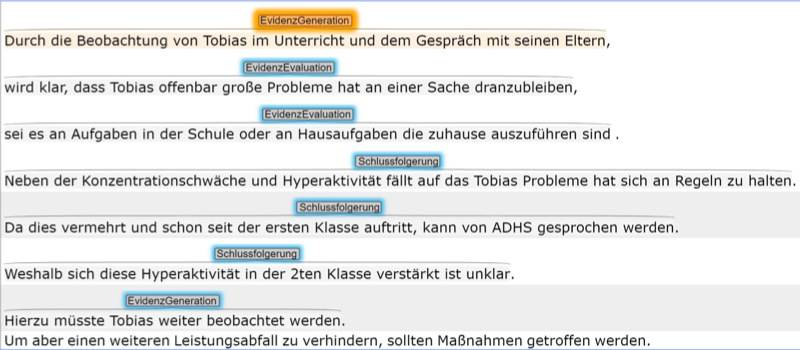FAMULUS
Annotate student essays with categories of diagnostic reasoning.
Source: This example was kindly contributed by Claudia Schulz, Ubiquitous Knowledge Processing (UKP) Lab, Technische Universität Darmstadt , Germany
Diagnostic reasoning is a key competence in many professions. Examples are diagnosing diseases and suitable therapies in medicine and diagnosing whether pupils with learning difficulties suffer from a disability in educational settings. A good university curriculum should thus not only educate students regarding factual knowledge but also support them in developing diagnostic skills.
The interdisciplinary FAMULUS project aims to study how online case simulations that provide automatic adaptive feedback can foster students’ diagnostic skills. To generate automatic feedback, we will develop novel methods for identifying and evaluating diagnostic reasoning (e.g. hypothesis generation, evidence generation and evaluation, hypothesis acceptance or rejection) in student essays.
The project uses INCEpTION to create a gold standard corpus of student essays annotated with categories of diagnostic reasoning. To improve the annotation efficiency, FAMULUS regularly uses the annotated data to train a deep learning LSTM-CRF model which is then connected to INCEpTION as an external recommender to provide annotators with automatic annotation suggestions.
References
- Schulz, Claudia ; Sailer, Michael ; Kiesewetter, Jan ; Bauer, Elisabeth ; Fischer, Frank ; Fischer, Martin R. ; Gurevych, Iryna : Automatic Recommendations for Data Coding: a use case from medical and teacher education. In: The 14th eScience IEEE International Conference, 29.10.2018–01.11.2018, Amsterdam, Netherlands. Proceedings of the 14th eScience IEEE International Conference (2018) [PDF] [BIB]

